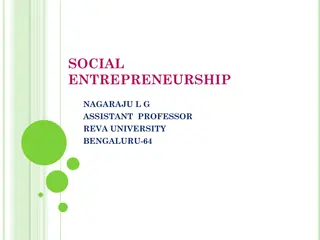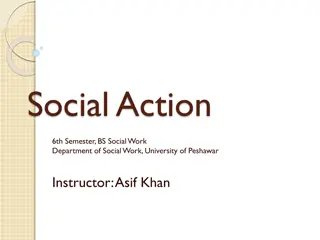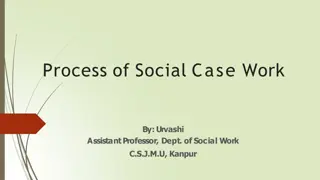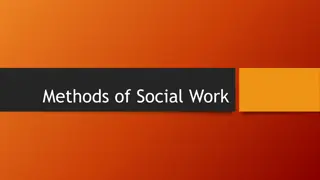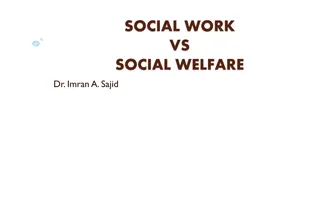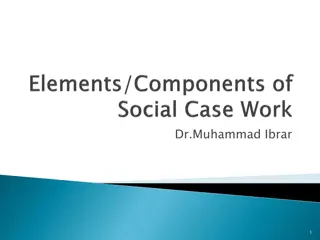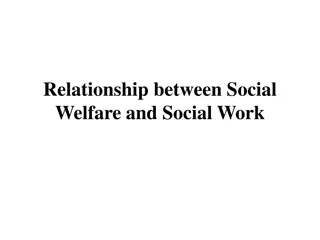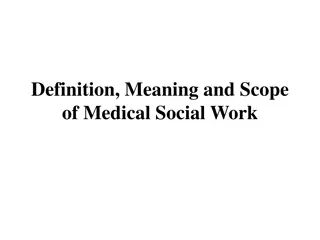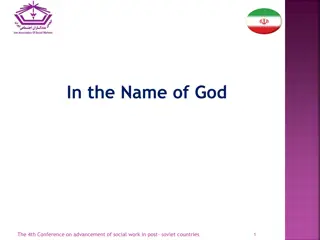Concept of Social Case Work and Objectives
In Social Case Work, individuals are helped through a defined process to address social and emotional living situations. Objectives include solving internal problems, strengthening ego power, and enhancing social functioning. Individualization is key in assisting clients towards better adjustment.
Download Presentation

Please find below an Image/Link to download the presentation.
The content on the website is provided AS IS for your information and personal use only. It may not be sold, licensed, or shared on other websites without obtaining consent from the author.If you encounter any issues during the download, it is possible that the publisher has removed the file from their server.
You are allowed to download the files provided on this website for personal or commercial use, subject to the condition that they are used lawfully. All files are the property of their respective owners.
The content on the website is provided AS IS for your information and personal use only. It may not be sold, licensed, or shared on other websites without obtaining consent from the author.
E N D
Presentation Transcript
Networking Networking
Concept of Social Case work Concept of Social Case work Component of Case work Component of Case work Objective of Case Work Objective of Case Work Principal of Case Work Principal of Case Work
Schools of Social Case Work 1. Diagnostic School of Social Case Work 2. Functional School of Social Case Work
Relationship between Client and Professional Worker 1. Subjective Relations 2. Conciseness relations
COP C COP = POLICE SOCIAL WORKER O P
Social Case work . Social Case work . Mary Richmond (1915) Social case may be defined as the art of doing different things for and with different people by co-operating with them to achieve at one and the same time their own and society s betterment. Perlman (1957) Social case work is a process used by certain human welfare agencies to help individuals with their problems in social functioning
Component of Social case work A PERSON with a PROBLEM comes to a PLACE where social workers helps him through a well-defined PROCESS - Perlman. Component of Social case work PERSON man, women, child, and aged, anyone with social emotional living. PROBELM arise from some need/obstacle/accumulation of frustrations or maladjustments which threaten the adequacy of the person s living situations or the effectiveness of his efforts to deal with it. PLACE - social service agency, social welfare department. PROCESS progressive transaction between case worker and client.
Objectives of Social case work Objectives of Social case work To understand and solve the internal problems of the individuals. To strength his ego power. Remediation of problems in social functioning. Prevention of problem in social functioning. Development of resources to enhance social functioning.
Principal of Social case work Principal of individualization Individualization is the recognition and understanding of each client s unique qualities and the differential use of principles and methods in assisting each toward a better adjustment. Principal of Social case work Principal of individualization Individualization is based upon the right of human beings to be individuals. And to be treated not just as human being but as a human being with his personal differences. personal differences. Client Case Worker enter into a close relationship. Problems entirely different from each other. Problems may be similar but factors involved in their causation causation are
Principal of acceptance Acceptance is a principle of action where in the Case worker perceives and deals with the client as he really is, including his strengths and weakness, his congenial(agreeable) and uncongenial(disagreeable) qualities, his positive and negative feelings, his constructive and destructive attitude and behavior, maintaining all the while a sense of the client s innate dignity and personal worth. Unconditional Unconditional acceptance of the client. Acceptance and approval. approval. Acceptance implies liking the client irrespective and conduct. irrespective of his negative qualities An expression of goodwill expression of goodwill towards the client. Conveying deep concern by the worker in spite of his problem-behavior. deep concern and active understanding active understanding to the client who is liked
Principal of Non-judgmental attitude Non-judgmental attitude is the recognition that the case worker s role is to understand and help the client rather than judge or condemn them. The principle is based on the conviction that the case work function excludes responsibility for causation of the problems and needs. excludes assigning guilt or innocence or degree of client But includes making evaluative judgments actions of the client. evaluative judgments about the attitudes, standards or E.g.: Criminal, though the society has already has already judged the criminal through its legal machinery, the social worker assumes a posture of anon a person worthy of attention. non- -condemnatory acceptance and helpfulness condemnatory acceptance and helpfulness, affirming the individual as
Principal of purposeful expression of feelings Purposeful expression of feelings is the recognition of the client s need to express his feelings freely, especially his negative feelings. It is the client s need for expression at a time when his problem is partially or predominantly emotional. Need to express feelings especially the negative feelings negative feelings. Frustration deprived. Frustration can result, if the basic psychological needs for expression are Case worker listens purposefully listens purposefully neither discouragingly nor condemning. Sometimes they can be actively stimulated. stimulated.
Principal of controlled emotional involvement Controlled emotional involvement is the case worker s sensitivity to the client s feelings, an understanding of their meaning, and a purposeful and appropriate response to the client s feelings. Need for communication case worker should not be emotionally with the client during the case work process. not be emotionally involved Response psychological element in the case work relationship and most difficult of the case work skills Response to the client on the feeling level feeling level is the most important most difficult of the case work skills. Communication is a two One person speaks directly and he expects response, need to maintain a certain degree of detachment. two- -way process way process. certain degree of detachment. Communication should be a combination of ideas and feelings. combination of ideas and feelings.
Principal of Client Self-determination Client self-determination is the recognition of the right and need of the client to have freedom in making his own choice and decision in the case work process. Conviction that every individual has the innate ability choices innate ability to make his own own choices, decisions under normal circumstances. Any case worker who prevents a client from taking decisions is unethical and unprofessional. unethical and unprofessional. Case worker is only an enabler expertise, to take the best possible decision circumstances. enabler who helps the client through his best possible decision and action in the action in the circumstances.
Principal of confidentiality Confidentiality is the preservation of secret information concerning the client which is disclosed in the professional relationship. It is basic right of the client. Necessary for effective case work service. Client must have a firm faith that the facts disclosed by him will remain confidential. Information is shared with professionals within / outside agency with client s permission. Obligation binds all equally to preserve the information.
Mary Richmond (1915) after 42years Perlman (1957) after 53years Rahul (2010) Social case work profession, in which professionals access or identifying the problem of individual or group and then solve with the help of scientific tool and pre-researched techniques for society betterment. Now it is called social-psycho-scientific process.


